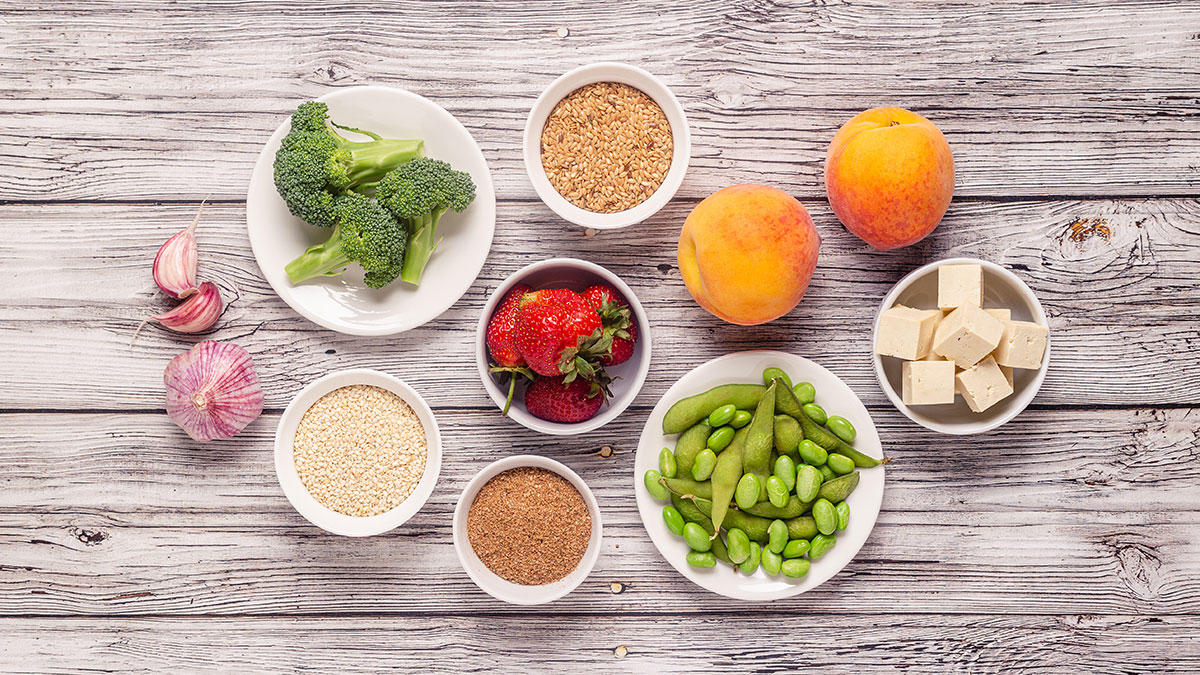Menopause food can range from foods filled with antioxidants to foods used to cool the body during a hot flash.
Luckily, the array of options is quite extensive – and it’s not necessarily vital that we eat these foods! They just work at keeping our bodies running smoothly through menopause.
Antioxidant rich foods, heart-healthy foods, foods for keeping muscle, essential foods for bone health, and cooling foods to help prevent hot flashes are all good for us while we’re dealing with menopause.
Each category of foods serves its purpose perfectly, especially considering the decline in estrogen levels throughout our body negatively impacts our overall metabolism while we face menopausal changes.
In fact, many of us women experience such dreadful symptoms during menopause, that we need to find a way to counteract and rebalance our body the right way – through the right foods.
Table of Contents [hide]
Antioxidant Rich Foods
Many fruits and vegetables are antioxidant-rich, which are perfect for us women while we’re going through menopause. You see, menopause can and may potentially cause cell damage in the body, and antioxidants repair that cell damage.
Fruits and vegetables are among the list of foods that help with menopause naturally. They also offer a great supply of additional vitamins and minerals, and they’re packed with fiber. All great positive features.
I personally fill half of my plate with fruits and/or vegetables every time I sit down to have a meal, and all of us women should do the same to boost the antioxidants in our bodies.
Not only do added fruits and vegetables contribute to a great diet overall, but they also help maintain a steady weight for us women and reduce hot flashes drastically.
The benefits are fantastic, and there are so many tasty recipes to follow to include fruits and vegetables in our daily diets.
Some of the best vegetables to eat include dark, leafy greens, like kale, broccoli, and spinach, along with peppers, carrots, and tomatoes.
Some of the best fruits to eat include different berries, tons of cherries, and a mango every once in a while.
Though all fruits and vegetables are generally good for our bodies as women, kale, broccoli, spinach, peppers, carrots, tomatoes, berries, cherries, and mango are proven to be the best according to leading health care professionals.
Heart-Healthy Foods
Heart-healthy fats within fish are known to help us women in various areas of our lives. For instance, fatty fish like salmon are filled with omega-3 fatty acids, known to be heart-healthy foods and known to improve overall brain function and mood.
They’re also the perfect foods to eat during menopause.
Such fatty fishes can also improve high blood pressure. In turn, stabilized blood pressure can reduce the chance of hot flashes – one of the most dreaded symptoms we go through.
To add, specific fatty fishes like salmon are also high in vitamin D, a popular vitamin known to improve mood and bone health throughout the body.
Other fishes that can be included in the list of heart-healthy foods consist of mackerel and anchovies. There are additional sources we can find our omega-3 fatty acids from, including chia seeds, hemp seeds, and flax seeds.
Sprinkling a bit of chia, hemp, or flax seeds into daily recipes will do the trick and reduce menopausal symptoms.
Foods for Keeping Muscle
Some of us women going through menopause have to deal with painful instances of muscle loss. Though the pain isn’t always astronomical, the stress of muscle loss can make us incapabable of certain tasks.
To avoid muscle stress, strain, and pain, we must keep our bodies’ protein supplies in check. That means, giving our muscles the necessary means they need to survive food-wise.
To give our body the strength it needs to survive minimum estrogen production, we must take in more foods filled with proteins. Such meats include fish and poultry, and such additional sources include legumes, seeds, and nuts.
Keeping up with protein intake is necessary, especially considering menopause generally leads to a decrease in muscle mass.
If it works better for you, as it does for myself sometimes, you can add protein powders to your water, smoothies, or even baked goods. Natural estrogen supplements can be paired with water and smoothie if necessary.
Keep in mind, if you’re a generally active woman, you’ll need to add even more protein to your diet. The muscle mass that you do have does not need to be overworked, especially if you’re not loading up on the appropriate nutrients to regain the lost muscle.
Essentials for Bone Health
When us women go through menopause, we have to deal with an intense lack of estrogen. This means that our bones become a little bit weaker than they were before, ultimately leading to bone fractures over time (potentially).
That’s why I, myself, and all other healthcare professionals are encouraging women going through menopause to take in more dairy products. This can include milk, yogurt, cheese, etc.
Really, the options are endless, so long as they include a sufficient amount of vitamin D, vitamin K, calcium, magnesium, phosphorus, and potassium. All of these nutrients are great for keeping up with bone health.
To add, eating a healthy amount of dairy can improve a woman’s ability to sleep better at night. Who wants to sleep an entire night without waking up to a hot flash? Me!
Plus, dairy products are quite delicious. I enjoy snacking on a simple slice of cheese every single day – it’s my guilty pleasure.
Cooling Foods for Hot Flashes
Hot flashes keep coming up in conversation, mainly due to the fact that us women experience them more frequently than we’d like to admit.
Luckily, foods for menopause hot flashes do exist, and they’re called cooling foods!
Cooling foods help out hot flashes and hot flash symptoms. To answer your question in advance, yes, you will have to eat these quite regularly to help your body process the foods properly.
Such foods include bananas, apples, broccoli, spinach, and eggs. Eggs and menopause actually go perfect together, reducing hot flashes at every turn. Green tea, as a drink, can also help reduce hot flashes.
The great thing about all of these food and drink options is that they are loaded with rich nutrients and they fend off many diseases due to the chemical property makeup they have within.
Foods to Stay Away From Through Menopause
Every food that we’re advised to stay away has its own warning or reasoning behind it.
We should avoid spicy foods. Spicy foods can actually have the opposite effect on hot flashes, increasing the symptoms. We don’t want even worse hot flashes than we’re already experiencing.
Also, spicy foods are awful for us if we additionally have high blood pressure. Stay away from hot peppers, jalapenos, etc.
We should avoid excess amounts of alcohol. A little bit here and there won’t have much of an effect, it’s when we drink more than one drink per day – menopausal symptoms may get worse.
That means, avoid drinking more than 12 ounces of beer, 5 ounces of wine, and 1.5 ounces of liquor in a given day. What to drink during menopause can vary, but it doesn’t typically hurt to pair a glass of red wine and menopause together.
Alcohol may increase hot flashes, but there are other areas of life it may harm, too. For instance, alcohol can increase anxiety and depression, making us feel not so good about ourselves. It can also affect our normal sleeping schedules. Not to mention, menopause weight gain.
We should avoid fatty foods. Fatty fish does not count as a fatty food. Nuts don’t count as fatty foods, either.
Instead, we should avoid a lot of fast food options, fried foods, and a bunch of processed foods.
Many processed foods and added sugars will increase blood pressure, affect glucose levels, and target other areas of our lives. High blood pressure and uneven glucose levels can lead to additional hot flashes in menopausal women.
Unfortunately, that means that even more foods must be avoided while in menopause, such as white bread and baked goods (muffins, cakes, etc.).
We should avoid drinking excessive amounts of caffeine. Drinking more than one cup of caffeine per day can actually increase the severity of our hot flashes, and that’s not a delightful situation to have to be in.
Once again, like alcohol, caffeine can interrupt sleep. Interrupted sleep is already a symptom of menopause, so there’s no need to additionally affect sleep schedules.
We should avoid eating foods high in salt. Unfortunately, the more salt we take in, the lower our overall bone density gets. As little as more than 2 grams of salt per day can have an effect on our bodies.
It doesn’t help that the decrease in estrogen while going through menopause can really harm our blood pressure – with added salt intake, our blood pressure rates could quite literally go through the roof.
Less sodium in the diet will help our bodies go through menopause more naturally, and that’s exactly what we need, considering menopause doesn’t ever feel natural in the slightest.
Foods to avoid during menopause do not provide quick relief for hot flashes and other menopausal symptoms. That’s why it’s necessary that we women, as a team, limit or completely avoid consumption of said foods!












No Comments Add one
Leave a Comment